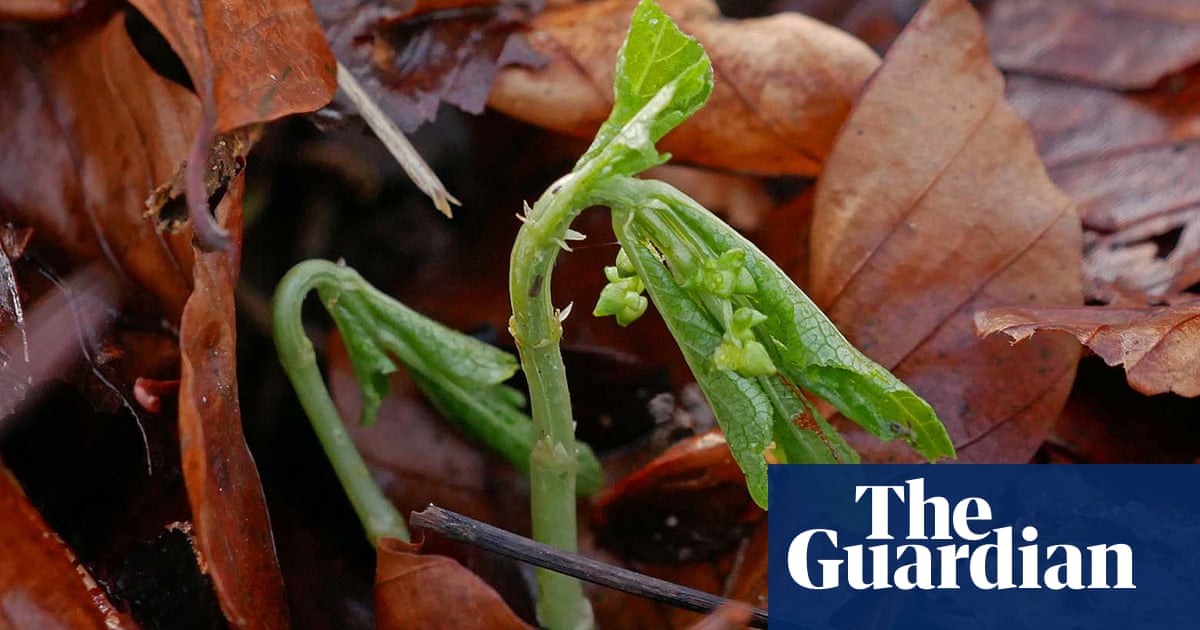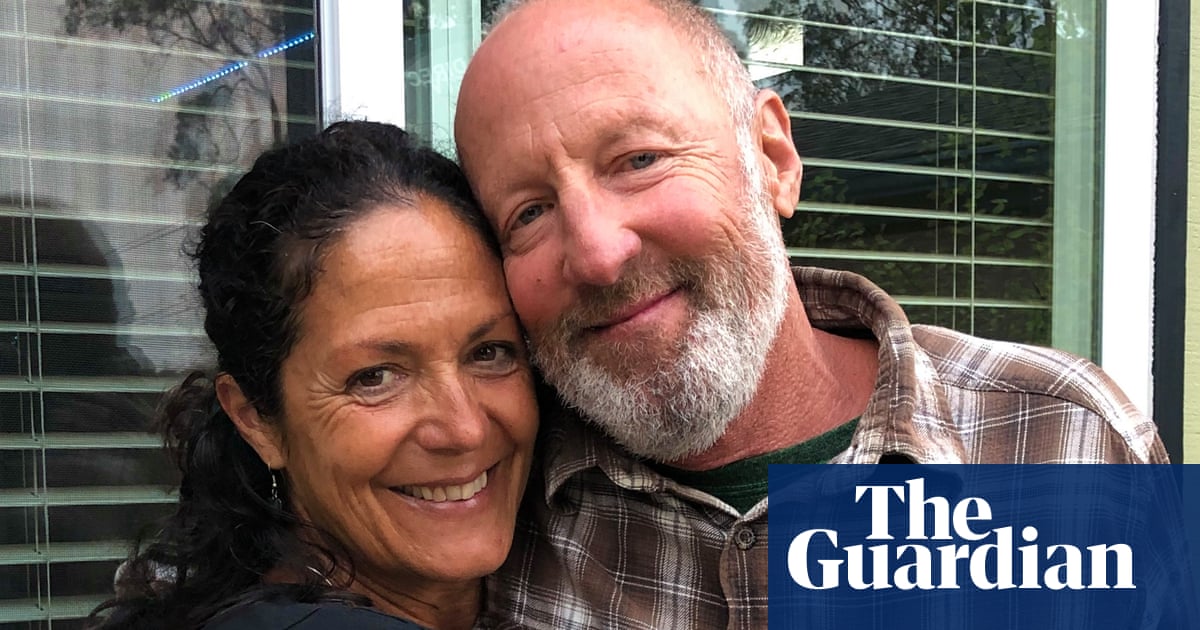
In Somerset, it has been a prolific summer for courgettes. I know this because they feature in at least three of the 10 dishes on the menu at the Old Pharmacy in Bruton. “We’re inundated,” says its chef patron, Merlin Labron-Johnson. I can’t decide between the tromboncino scapece – coins of a thin, curling, pastel-green courgette native to Italy, fried in garlicky olive oil then quick-pickled in vinegar, served cold as an antipasto – and a bigger dish of grilled chunks of yellow courgette with preserved lemon, courgette cream, nasturtiums and salty, lemony almonds. I order both.
The Old Pharmacy’s blackboard menu is a snapshot of what is good and in season not just in the area, but at Labron-Johnson’s nearby farm, where he grows almost all of the fresh produce that this and Osip, his small, high-end restaurant next door, put to work in their kitchens. “We grow every vegetable, herb and fruit that it’s possible to grow in the UK,” he says, not least all those courgettes. “And we don’t need to look much further than Somerset for everything else – we have Westcombe for cheese, Bruton Organic Dairy for meat, and in winter we go to a local hunter for game.” The scapece arrives crowned with basil leaves and swimming in a golden pool of peppery olive oil; I order bread to mop it up, which arrives with a blob of freshly churned, salted butter. I’m in Somerset; it would be rude not to.
Excellent produce – and growing it himself – is just one strand of the allure that brought Labron-Johnson to Bruton. He grew up in the south-west of England but had spent most of his cooking career in London; he earned his first Michelin star at 24 at Portland in Marylebone, and opened three restaurants in four years to huge critical acclaim. But he was burnt out. “I was so much happier when I wasn’t in London,” he says. “It all felt a bit meaningless. People would order food, I’d cook it, they’d say thank you, they’d go. I wanted to work somewhere that felt like something greater than a restaurant, and I felt I couldn’t have that in London. I was missing a connection with the people eating my food – but also with the food itself.”
Labron-Johnson was not alone in feeling that way. He is just one of a cohort of London restaurateurs who have packed their bags for the south-west in recent years, among them Nicholas Balfe, who left Brixton for South Petherton in Somerset, where he has opened Holm; Oli Barker of east London’s Brawn, now in Salcombe in Devon at Hope Cove House; and Ben Coombs, formerly the head chef at Rochelle Canteen, who now runs Argoe in Newlyn, Cornwall, to name just a few. And then there is Clare Lattin, a successful food PR and restaurateur, who upped sticks to Ashburton in Devon and, seven weeks ago, opened Emilia, a rural English “osteria” inspired by “that amazing little place you just fell upon in a tiny Italian village, so unassuming on the outside, but where you ate the best plate of pasta of your life”.
For Lattin, something was missing in London. She had co-founded Soho’s Duck Soup and Little Duck the Picklery in Hackney, east London, both now stalwarts of the city’s restaurant scene serving a particular kind of modern British gastronomy – great-quality seasonal ingredients treated simply to become the best versions of themselves, with low-intervention (or “natural”) wines. “I just needed something else in my life – it couldn’t just be going to work and drinking in nice wine bars,” she says. Lattin and her partner shared a desire to “be on the land a bit more” and set out to find a house where they could “grow vegetables, plant trees and get lost with a purpose”. She craved a life aligned with nature – it’s hardly surprising, since chefs and restaurateurs are necessarily attuned to how the weather affects harvests, or how the time of year dictates produce. For some, perhaps a desire to live among it becomes inevitable.
Margot Henderson, the chef patron of Rochelle Canteen in Shoreditch, east London, will open the Three Horseshoes, a pub in Batcombe, Somerset, in early 2023, and is enjoying the proximity of producers there. “It’s incredible to know the farmers and talk to them properly about their methods. Just this morning I was speaking to Tom [Calver] of Westcombe Dairy about how they’re changing the ways they feed their cows, including more salad in their diet, because the flavour [in the cheese, cream, milk] comes from the ground up.” It is not only professionals who have such zeal for good produce and its provenance. “Frome is 10 minutes away from the pub,” says Henderson. “And what a town! People will come up to me and say: ‘Oh, I’ll breed you some pigs’, or ‘I’ll make you some bread’ – they’re all on it.”
Lattin agrees. “People with smallholdings, homesteads, have turned up at the restaurant, offering us sensational blackcurrants or rhubarb from the boot of their car, or said: ‘We’re going to kill a pig on Monday,’ and we’re able to plan our menus based on that.”
The south-west offers, then, enough local appetite not just for a couple of good eateries but for a veritable restaurant scene – “a culture of chefs”, as Henderson puts it. “It’s becoming like the south of France as Elizabeth David was writing about it – you can visit and be guided by restaurants, bars, pubs, producers, and we’ll all feed off each other because we’re all linked,” she says. Producers might well be the foundations of all of this, the area being home to some of Britain’s best known organic farms, such as Riverford in Buckfastleigh, Devon, but also smaller operations that have quietly been supplying some of London’s most illustrious restaurants for years – Good Earth Growers, Kernowsashimi and Philip Warren butchers are all in Cornwall.
The allure of Cornish beaches and restaurants (synonymous with celebrity names such as Jamie Oliver and Rick Stein) is nothing new, of course, and visitors have long been heading to the south-west on holiday. So it is perhaps surprising that only now is a critical mass of chefs deeming the area safe enough to set up shop. The appeal of the place is obvious, a wilder version of the English bucolic idyll than the Cotswolds’ chocolate box rendition, but why only now?
For Labron-Johnson, who opened Osip just three months before the first lockdown, Covid-19 was the gamechanger. “A lot of people moved down here during the pandemic,” he says. “They realised they could work remotely, and even if they needed to commute to London, that was pretty easy from here.” He says there were already a few high-profile people from the creative industries living in Bruton – unsurprising given it is already home to the celebrated Hauser & Wirth gallery and several good restaurants – “and once you have that, you have a hub”. He noticed new locals and more holidaymakers of a kind that valued “food with a story”, which is what he had set out to provide at Osip.
Covid changed the direction of Labron-Johnson’s business; forced to shut the restaurant for three months, he focused on growing produce, to supply the restaurant when it reopened. “It was always my long-term goal, but within the first two weeks of lockdown I started to teach myself and cycled up to my allotment two or three times a day to tend to it.” He started a shop in Osip to support his suppliers, which the locals took to, and when he reopened the restaurant it had evolved from a French-style country bistro (“which felt like the safe option”), to a farm-to-table destination “which still has the soul of a bistro, but is more special. We’ve done away with any kind of a menu, people don’t know what they’re getting on a given day, which allows us to respond to what we grow on the farm and what’s best at the time.” By the third lockdown, he had taken on a 60-acre farm and the space next door to Osip, which became the Old Pharmacy.
For Lattin, too, it was the pandemic that changed the course of things, and made her hanker for something else. Emilia would not be open were it not for Covid, she says. Having found a home in 2019, she would spend long weekends in Devon then return to London for four-day working weeks, “which I found very hard. I’d planted trees, fruit, vegetables and was quite literally missing the fruits of my labour – the blossom on the trees, my first crops – by spending so much time away.” When lockdown hit, she worked from home in Devon and never went back to London. A restaurant, she says, “was never on the agenda”, but her business partner at Duck Soup and Little Duck, the chef Tom Hill, also wanted to spend more time out of the city, and so her dreams for an unassuming Italian-Devonian osteria evolved with his. And the community, she says, have welcomed them warmly.
It is a different kind of market, though – an increasingly affluent one, yes, but also one in which people eat out less. “Going out is a special-occasion thing,” says Labron-Johnson, and while Lattin agrees that people might use restaurants less regularly, they are more prepared to travel. “Driving for half an hour to a restaurant does not seem ‘far away’ here.” Both say they have quickly built up a set of regulars: Emilia’s clientele is already about 70% local, says Lattin, while Labron-Johnson guesses that locals make up just over half of the diners at Osip (where a six-course tasting menu costs £89 a person). Osip probably gets some local custom from people who have visited the Old Pharmacy first, which Labron-Johnson describes as “part wine bar, part community cafe”: it is certainly the former, with elaborately illustrated empty bottles lining its shelves, telling a story of low-intervention winemaking that mirrors the ethos in the kitchen, not to mention a great list. And it’s a community cafe insofar as it reflects the prosperity of Bruton and its environs; when I visit, a woman on a MacBook works quietly in the corner, two thespian teenagers talk in loud voices about their A-level results, and several ladies in billowing white shirts and bohemian jewellery arrive for lunch.
“It’s lovely to be closer to the producers, but it doesn’t make the produce any cheaper,” says Henderson, “so it’s nice to have people around who can afford the food we make with it.” Even if they’re eating out less, she says, a combination of locals, swathes of visitors and, crucially, lower overheads make for “opportunities we can’t afford in London”, with its prohibitively expensive real estate. Many of the capital’s restaurant institutions, such as St John, the River Cafe and Henderson’s own Rochelle Canteen, were established in a more accessible London of old, when rents were cheaper, not to mention running costs. “There’s a fickleness to the food scene in London,” says Labron-Johnson. “Very few places become timeless – I’ve seen so many restaurants open, be so hot, then close.”
He moved south-west, like many others who do so, to be part of the community, and to plant roots in more ways than one. He sends me home to London groaning with produce – pink fir apple potatoes, vine tomatoes so ripe that their skins are bursting, spring greens and, of course, tromboncino courgettes, which curl and peek out of my bag all the way home on the train from Bruton.












